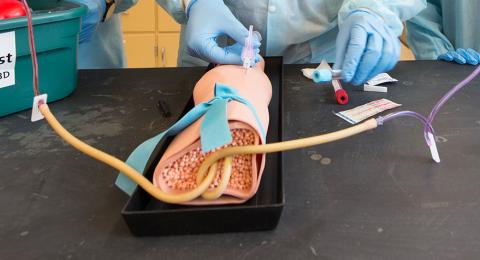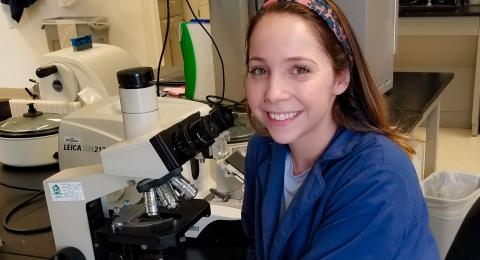The Biomedical Science minor at UNH will enhance your understanding of human health, disease mechanisms and medical research. This minor appeals to students who are detail-oriented, science-driven and passionate about improving human health. Ideal for those planning to enter medical school, pursue graduate studies or work in the biomedical field, this minor strengthens scientific knowledge and prepares you for advanced career opportunities.
What is biomedical science?
The biomedical science minor will provide you with an introduction to molecular and cellular biology, and anatomy and physiology. You will then be able to select from a wide variety of courses to tailor your minor to your interests. Combine this minor with a major in an area such as biology, chemistry, health management and policy, neuroscience and behavior, nutrition, psychology, education or environmental studies to enhance your career opportunities or to prepare for further study at the graduate level.
Why study biomedical sciences at UNH?
At UNH, you’ll receive an outstanding academic foundation and gain lab experiences to help prepare for successful careers or future studies. The biomedical sciences minor has highly experienced faculty with demonstrated excellence in teaching, research and career guidance. You’ll have access to state-of-the-art facilities in faculty research labs, the Hubbard Center for Genome Studies, the University Instrumentation Center, the NH Veterinary Diagnostic Laboratory and the UNH Agricultural Experiment Station facilities, all located on campus.
Potential career areas
- Clinical research
- Federal or state regulation
- Healthcare
- Laboratory technician
- Research
Curriculum & Requirements
Students who wish to develop focused competencies in the broad area of the biomedical sciences can complement their major academic program with a minor in biomedical science (BMS).
- Academic policies related to Minors.
- The minor consists of a minimum of 20 credits.
- no more than 8 of which can also be used to fulfill major requirements.
- A grade of C-minus or better is required for all courses counted towards the minor. A "C average" (2.00) is required in courses that the minor department approves.
- Pass/fail courses can not be used for the minor.
| Code | Title | Credits |
|---|---|---|
| Required Courses | ||
| BIOL 411 | Introductory Biology: Molecular and Cellular | 4 |
| BMS 508 | Human Anatomy and Physiology II | 4 |
| or ANSC 512 | Animal Anatomy and Physiology II | |
| Select additional courses from the list below to complete 20 total credits for the minor. Note: some courses may have prerequisites. | ||
| BMS 501 | Microbes in Human Disease | 4 |
| BMS 503 & BMS 504 | General Microbiology and General Microbiology Laboratory | 5 |
| BMS 560 & BMS 561 | Body Fluids and Body Fluids Laboratory | 4 |
| BMS 602 & BMS 603 | Pathogenic Microbiology and Pathogenic Microbiology Laboratory | 5 |
| BMS 610 | Biomedical Lab Management | 4 |
| BMS 623 | Histology: Microscopic Cellular Structure and Function | 4 |
| BMS 635 | Preceptorial in Prehospital Care | 2 |
| BMS 640 | Phlebotomy Theory | 2 |
| BMS 644 | Clinical Hematology | 3 |
| BMS 650 | Molecular Diagnostics | 4 |
| BMS 655 | Human and Animal Parasites | 3 |
| BMS 656 | Immunohematology | 3 |
| BMS 658 | Medical Biochemistry | 3 |
| BMS 702 | Endocrinology | 4 |
| BMS 703 | Infectious Disease and Health | 4 |
| BMS 704 | Pathologic Basis of Disease | 4 |
| BMS 705 | Immunology | 3 |
| BMS 706 | Virology | 3 |
| BMS 711 | 4 | |
| BMS 712 | Experiences in Applied Veterinary Diagnostics | 2 |
| BMS 718 | Mammalian Physiology | 4 |
| BMS 719 | Host-Microbe Interactions | 4 |
| BMS 720 | Mycology, Parasitology, and Virology | 3 |
| BMS 730 | Ethical Issues in Biomedical Science | 4 |
| BMS 740 | Human Microbiome | 4 |
| BMCB 605 | Principles of Cell Biology | 4 |
| BMCB 753 | Cell Culture | 5 |
| GEN 704 | Microbial Genetics and Genomics | 5 |
| GEN 717 | Molecular Microbiology | 5 |
| HMP 501 | Epidemiology and Community Medicine | 4 |
| NUTR 750 | Nutritional Biochemistry | 4 |















